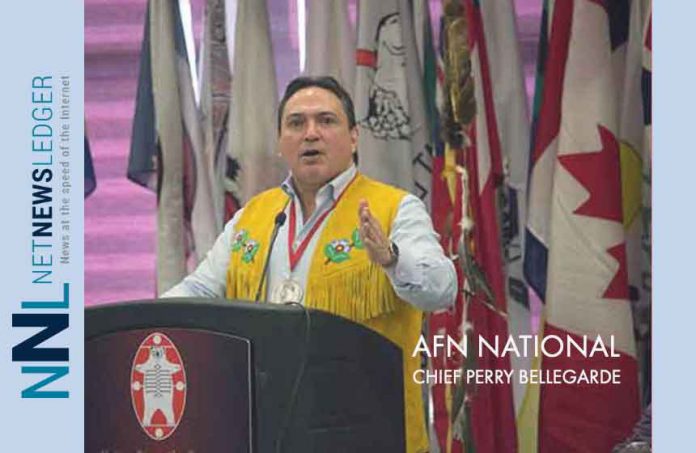The next six months are going to get very interesting for the Assembly of First Nations
One can’t always say that, especially in recent years. For decades, the organization has been criticized for making status quo decisions and electing national chiefs too staunch (see: Matthew Coon Come), too distant (Shawn Atleo), or too cozy (Phil Fontaine) when dealing with the federal government.
The AFN is not a government but a lobby group for First Nations chiefs. Its ability to deliver policy and programs is weak, so it is at the mercy of politics and the will of whoever is in power in Ottawa.
The organization is also funded by federal dollars, so many see it as acting as much in Canada’s interests as Indigenous ones — which is problematic when it comes to discussions on lands, laws, and rights.
Still, the AFN has been critical in spurring major policy and political changes for First Nations since the 1970s. It was a leading voice in having Indigenous and treaty rights affirmed in the Constitution (1982) and a recognition of self-government in the failed 1992 Charlottetown Accord.
More recently, the organization took a lead role in the creation of the Kelowna Accord, the residential school settlement agreement (forming the Truth and Reconciliation Commission of Canada), the Indigenous Languages Act, and federal Bill C-92, which enables First Nations to take control over their child and family services.
Bottom line: the AFN continues to be a major site for First Nations politics — even if it’s called weak, out of touch, and irrelevant by critics.
An organization that has long-resisted change now must do so. A growing and changing world, a burgeoning young population of educated Indigenous activists, and movements such as Idle No More, #MeToo, and Black Lives Matter demand it.
National Chief Perry Bellegarde announced last month he will not run for re-election in July.
Bellegarde said he will spend his remaining months in office helping shepherd in the federal Liberals’ long-promised Bill C-15, that will bring Canada’s laws in harmony with the United Nations Declaration on the Rights of Indigenous Peoples.
After that, a new leader will be elected by 634 First Nations chiefs and, for the first time — due to COVID-19 restrictions — the vote will be held virtually.
I can hear it now: if chiefs can vote virtually, why can’t all First Nations citizens, making the “national chief” an actual representative of all First Nations peoples?
See what I mean?
Over the next few months, the AFN will face critical questions about how it does, and has done, its work.
Headlining this is an ongoing crisis surrounding the organization’s treatment of women.
There has never been a female national chief (Roberta Jamieson came close in 2003, with nearly 40 per cent of the votes), yet the majority of AFN employees are Indigenous women. Half of the leadership team are Indigenous women, and the education of First Nations women out-number men nationally nearly three-to-one.
In a well-researched piece last month in the National Observer, Algonquin journalist Karyn (Pabàmàdiz) Pugliese documented how Indigenous women at the AFN are some of the most qualified to lead the organization but have been the target of sexual harassment, violence, and bullying.
“In our elected governments, First Nations want to ask themselves: where are our women?” Pugliese writes. “In a post-#MeToo, post-MMIWG era, women leaders are asking for change and accountability.”
At their annual general meeting last month, chiefs voted to conduct an investigative review of sexual orientation and gender-based discrimination within the AFN.
During the debate for the review, Ontario regional chief RoseAnne Archibald named Bellegarde as “the biggest resistance to this process,” alongside the other regional chiefs.
“We have problems within the Assembly of First Nations,” Archibald announced. “Women are not always respected, especially on the executive.”
Many chiefs are now calling for an Indigenous woman to head the AFN for the first time.
Potential leading candidates include Archibald, Yukon regional chief Kluane Adamek, and former Manitoba Keewatinowi Okimakanak grand chief Sheila North (who placed second to Bellegarde in the 2018 election).
It also places into question Bellegarde’s credibility to lead the movement to support Bill C-15, which — if passed — would result in radical changes for First Nations.
Mohawk policy analyst Russ Diabo (who ran for AFN national chief in 2018) recently wrote: “If passed, Bill C-15 will be used by the government of Canada to reinforce the status quo, because the bill makes it clear that existing national laws — many of which violate Indigenous rights — will prevail over UNDRIP.”
This all makes for an interesting path to a new national chief, and maybe a new AFN.
 Niigaan Sinclair
Niigaan Sinclair
Originally appeared in the Winnipeg Free Press in January 2021. Republished with the permission of the author.
The views, opinions, and positions expressed by all columnists and contributors are the author’s alone. They do not inherently or expressly reflect the views, opinions and/or positions of NetNewsLedger.


